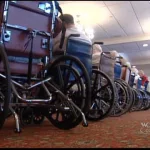
ST. ALBANS, Vt. (WCAX) – Industry officials say new federal staffing mandates for nursing homes could add to Vermont’s workforce woes, and patient access to long-term care facilities.
Franklin County Rehab Center in St. Albans has no trouble filling its beds. It’s nurses that are hard to come by.
“There’s just not enough bodies here in Vermont to fill our needs,” said the center’s Coleen Condon.
A shortage of beds and the staff to tend to patients has plagued Vermont’s nursing homes and long-term care facilities for years.
Condon has had to dramatically increase pay to attract local staff and invest in expensive traveling nurses. Now, she worries a new federal mandate will create even more staffing stress. “This staffing mandate is unbelievable, and it’s really going to hurt our facilities not only here but across the nation,” she said.
Current state regulations require three hours of nursing care per resident per day. The Biden administration recently mandated the first-ever federal minimum staffing rule for nursing homes.
It requires federally-funded nursing homes to provide at least 3.48 hours of nursing care per resident per day and a registered nurse on-site at all times.
“It’s been known for a long time that staffing has been potentially inadequate in nursing homes without federal guardrails,” said Pamela Cota with the Vermont Department of Disabilities, Aging and Independent Living.
Those federal guardrails will impact 34 nursing homes in Vermont as early as this summer. Facility payroll data estimates the regulations will cost Vermont nursing facilities $10.3 million annually.
“I’ve been in long-term care all my life and I have a great love and passion for the elderly. And this, you know, this is not the answer,” Condon said.
Nursing homes in rural areas will have slightly more time to implement certain changes, and struggling facilities may qualify for temporary exemptions. But without efforts to attract health care workers, many facilities worry closure is imminent.
“This state is going to have to come together and really look at this because you can’t create bodies out of thin air or professionals out of thin air,” Cota said.
Nursing providers are scheduled to gather in Washington D.C. in June to discuss the new regulations.
